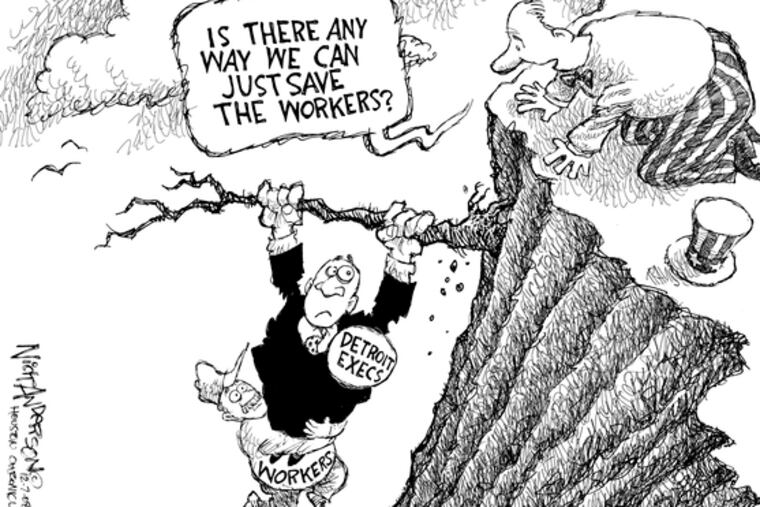Detroit: A romance gone sour
HOW DID IT come to this? The current debate on whether to rescue Detroit automakers reflects a deep animus toward that most American of enterprises, the auto companies.

HOW DID IT come to this?
The current debate on whether to rescue Detroit automakers reflects a deep animus toward that most American of enterprises, the auto companies.
It feels almost like a nasty divorce. You know, you've either been through one, or had friends who have, and after a while, everything is exaggerated, every utterance is an assault, nothing makes sense. All that's left is hatred and distrust.
Two cases in point:
I was in a bar in New York City the other day when a man I just met was positive that Ford workers once upon a time sabotaged their own products as part of a labor dispute with the company. They put beer cans in the doors so there would be a built-in rattle, he swore.
And at a family dinner recently, a young man I'd seen grow up swore that Detroit has been making subpar vehicles that nobody wants for 20 years. Others are positive that the United Auto Workers is composed of demons who have brought on the demise of an industry.
This is the point at which facts don't really matter. Just like in a divorce. The wife has her facts, or her view of the facts, and the husband has his. It's all perception, not based in any reality.
When it comes to vehicles, both the East and West coast voted long ago. But in the vast middle of the country, the love of foreign cars is much less in evidence. When you drive there you can plainly see the Big Three still rule the streets.
A few months ago, I was listening to a talk-radio show, and a guest said he'd just traded his Cadillac for a BMW. Why, the host wanted to know.
The car owner was a single man, and while he thought the Cadillac was a much better car, women were more impressed with the Beemer.
Again, perception.
Moreover, during the current debate on the auto industry, we've managed to demonize domestic car makers as "Detroit."
I lived and worked in metro Detroit for several years, in a town dominated by mid-level Ford managers and engineers.
They're not a nameless, faceless bunch you can call "Detroit." They're real human beings I went to church and shopped with. I watched them raise their families, go to the park, walk their dogs.
All of that seems lost in the current debate. Why can't Detroit make hybrids, like the Prius? I keep hearing that from TV commentators. I keep wondering if he's ever looked at the streets of Manhattan, where Ford Escape Hybrids are ubiquitous in the cab fleets of New York.
Are we all just remembering the '70s? America made some truly awful cars in the '70s, by every measure. Hello? That was nearly 40 years ago.
We won't forgive Detroit for making bad cars 40 years ago? This isn't an original thought, but it's worth repeating: By 1981, four decades after Pearl Harbor, had we forgiven the Japanese?
At the risk of inserting facts into this issue, let me offer this.
Consumer Reports, which car buffs like me think has had a historic fondness for Japanese vehicles, wrote the following in its 2008 car reliability survey:
"Ford's reliability is now on par with good Japanese automakers."
Or let me cite the 2008 findings of the prominent auto study firm, J.D. Power and Associates:
The No. 1 vehicle for midsize cars in its initial quality survey is the Chevy Malibu.
No. 1 for large cars is the Pontiac Grand Prix.
One last factual point in what is clearly an emotional debate - you keep hearing in conversations both public and private that American car makers have to learn to build vehicles that people want to buy.
The much-sullied General Motors, the company that is the target of much public and private wrath, is the world's largest vehicle manufacturer.
Bigger than anybody. The company sold 9.3 million vehicles last year.
Somebody, lots of somebodies, wanted to buy their products.
Every August, I go back to Detroit, to Woodward Avenue, a storied boulevard that runs though the heart of the city and its northern suburbs.
Tens of thousands of folks bring their old-time vehicles from the '40s, '50s and '60s to that street for a celebration of American iron. It's called the "Dream Cruise" - a parade of autos that glides up and down the boulevard - and it draws something like 1.5 million spectators every year.
They believe.
So do I. *
David Warner is a former city editor of the Daily News, and a former metro editor at the Detroit News. He drives a Ford.